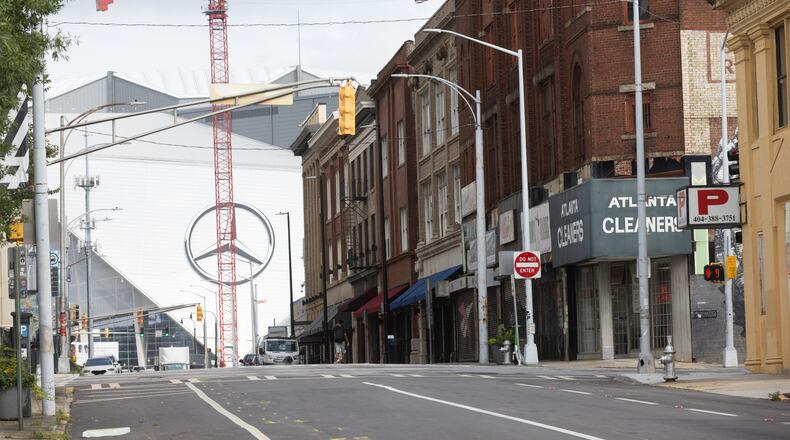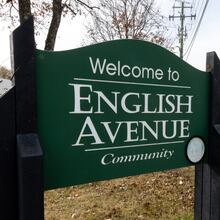If 2023 taught us anything, it might be that Georgia’s economy is quite resilient in the face of challenges.
Economic growth ebbed, but it did not collapse. Job creation might have been softer than in 2022, but Georgia’s jobs engine kept cranking.
For all the — legitimate — handwringing about the potential for a recession, Georgia emerged from 2023 in good shape economically. But questions remain as 2024 dawns.
Will the Georgia and national economies stick the soft landing?
What will happen with interest rates and home prices and the housing affordability challenges that have strained the Atlanta region for years?
Metro Atlanta continues to have a glut of unused office space with landlords that have loans coming due, heralding a likely year of financial pain to come for owners and their lenders, and opportunity for some investors to buy towers at bargain prices.
And relatedly, what becomes of South Downtown Atlanta? A new buyer stepped up to take on one of the city’s biggest-ever adaptive reuse projects, saving it from impending foreclosure.
These are some of the major storylines The Atlanta Journal-Constitution business team will be watching in 2024:
Jobs
Credit: HYOSUB SHIN / AJC
Credit: HYOSUB SHIN / AJC
Against the headwinds of higher interest rates, inflation and a chorus of Cassandras predicting recession, Georgia employers kept hiring in 2023. But the pace of growth slowed, and the expansion has become more uneven. There have been some layoffs in tech, while much recent growth has been in sectors like hospitality and government that are still playing catch-up from the pandemic-triggered losses.
The Federal Reserve has said it is ready to hike rates to address any persistent inflation if needed, but if prices continue their downward trajectory, the Fed is more likely to start cutting next year. The current signals show expansion continuing, but at a modest pace.
Georgia’s economy will expand 1.1%, while unemployment will tick up and the number of jobs will grow by only 0.7%, less than half the pace of this year, according to the annual forecast by the Terry College of Business at the University of Georgia. That will be slightly faster than the growth rate for the nation, according to the forecast.
Geopolitical factors including war in the Middle East, and Europe, oil prices and a presidential election in the U.S. are all factors as well.
Housing
A shortage of homes on the market in 2023 meant slower sales without a fall in prices. That shortage was two-fold. On one hand, many owners sat tight rather than trade their current low mortgage rate for a more costly one in a new home. And on the other, construction of houses has never returned to the pace of the early 2000s even as population kept growing.
Mortgage rates peaked in the fall at a 23-year high, but they’ve been sliding since. Will cheaper rates spur many more wannabe buyers, which could dramatically bid up the price of homes? Will thousands of longtime owners finally put their houses on the market and create a price-cutting glut?
Or perhaps, both?
Will the need for more homes will add to pressure on towns and cities to loosen zoning restrictions so that new building can pick up the pace?
Likely, what we’ve seen the past few years will continue to be what the region gets. If there’s no dramatic change in the equation, metro Atlanta will see a shortage of homes for sale, slightly higher prices and lots of debate about how to address the scarcity of homes.
Rents, meanwhile, continue to dip in the Atlanta area, a positive sign for renters after a years of rapid growth strained many households.
Inflation
Credit: Jenni Girtman
Credit: Jenni Girtman
Overall inflation, according to government measures, peaked at a 9% annual rate in mid-2022 — and it was slightly higher in metro Atlanta, where a rising population meant more spending on goods and services. But it’s been dropping since then.
Toward the end of 2023, overall inflation fell toward the Federal Reserve’s target of 2%. That means the average was still growing, albeit modestly.
And many things were actually getting cheaper. Down, down, down went prices for eggs, gasoline, smartphones, new rental agreements, airline tickets, refrigerators, ovens and washing machines.
Coming out of the pandemic, wages and salaries had been growing — but only some paychecks kept pace with prices, so many workers fell behind. With jobs still plentiful, households have a chance to make up the ground they lost — but only if inflation doesn’t spike again.
Many consumers were spooked, but as the year ends, the worst pain seems to be receding in the rearview mirror.
Commercial real estate
Credit: Transwestern Real Estate Services
Credit: Transwestern Real Estate Services
The availability rate for offices stood at nearly 31% in at the end of the third quarter as demand for office space remains tepid. Hybrid work schedules and remote work are still weighing on the office sector. Many companies are scaling back how much space they need despite still adding jobs.
The lending environment remains tough for developers and owners of offices, hotels, apartments and retail centers. New development has slowed and borrowers with loans are feeling pressure to sell or refinance to pay off debts.
Refinancing is tough. Properties with high vacancy rates aren’t worth what they were when they were fuller and many banks and other real estate lenders are looking to shed risk from their portfolios, meaning commercial foreclosures are likely to rise.
A number of high-profile properties returned to their lenders or faced imminent foreclosures this year, including the Sheraton Atlanta Hotel, Buckhead’s Tower Place 100 and the Midtown site pitched for the Opus Place condominium complex.
Despite the turmoil, office towers, retail centers, apartment buildings and hotels in the best locations, such as Midtown and along the Beltline, will continue to perform well.
South Downtown
Credit: HYOSUB SHIN / AJC
Credit: HYOSUB SHIN / AJC
The saga of South Downtown had more twists and turns in 2023 than a dime store thriller.
Citing global economic headwinds, German developer Newport stopped financially supporting the project early in the year, stalling work on the 10-block redevelopment effort near the Five Points MARTA station. A deal to sell the entire project portfolio to local development firm Braden Fellman Group over the summer fell through, nearly resulting in foreclosure for South Downtown’s 50-plus properties.
But at the end of the year, redemption looked like the storyline to come.
David Cummings and his co-investor Jon Birdsong, the duo behind Atlanta Ventures, announced they were under contract to acquire the South Downtown portfolio. Their plan centers on turning the district into a second Atlanta Tech Village business incubator.
South Downtown is a key piece in the overall revitalization of downtown. There’s a lot riding on not only Cummings and Birdsong’s plans, but also those of CIM Group’s Centennial Yards and Underground Atlanta.
These projects aim to redefine living and working in the central city. There’s also a bit of an artificial clock ticking to have downtown buzzing again with the World Cup coming in summer 2026, and the eyes of the world looking at Atlanta like it hasn’t since the 1996 Summer Olympic Games.
Artificial intelligence
Credit: Bita Honarvar
Credit: Bita Honarvar
How will Georgia workers and businesses adjust to the rise of AI? What role might the Atlanta area play in development of the powerful computing technology?
Though many of the biggest players in AI are based in California, a group of Atlanta leaders might have a significant say in ethical considerations around the technology. Five Black nonprofit, activist and educational leaders with strong Atlanta ties will be part of a new ethics council on artificial intelligence co-chaired by Sam Altman, CEO of OpenAI, the company behind ChatGPT.
Greenwood and the Gathering Spot
Greenwood and The Gathering Spot, two Atlanta-based and Black-founded companies, famously merged in 2022, then famously quarreled last year before attempting to mend fences. But by December, the two companies parted ways, though they will still have business ties to one another.
Credit: Miguel Martinez
Credit: Miguel Martinez
Greenwood is a growing financial technology company with well-known founders like Ryan Glover, Paul Judge, Killer Mike and former Atlanta Mayor Andrew Young.
The Gathering Spot, meanwhile, has carved a niche as not only a co-working company, but a major center for the modern African American business community of Atlanta.
The next steps for both companies will be closely watched in 2024.
Fearless Fund and affirmative action
Credit: Kelly Yamanouchi
Credit: Kelly Yamanouchi
A conservative group sued the Atlanta-based and Black women-founded venture capital firm Fearless Fund in August alleging racial discrimination in a grant program it runs that supports Black women founders. The suit is part of a broader effort to chip away at corporate diversity efforts nationwide.
How that and other litigation involving private sector diversity programs plays out could set the stage for fierce court battles over affirmative action that could again reach the U.S. Supreme Court.
Hollywood’s return to Georgia
Credit: RODNEY HO/rho@ajc.com
Credit: RODNEY HO/rho@ajc.com
Strikes by the writers and actors shut down production of scripted television shows and movies in Georgia. With those strikes concluded, and new labor deals signed, what’s next for Georgia entertainment industry?
With the potential for mergers among major media companies, will Georgia continue to rank among the top locations in the U.S. for film and TV production?
A recent state audit highly critical of the film tax credit, meanwhile, could create momentum for changes to the expensive incentive program.
The Airport
Credit: Jason.Getz@ajc.com
Credit: Jason.Getz@ajc.com
Hartsfield-Jackson International Airport is again the world’s busiest. A number of major construction projects are designed to improve service and capacity. The $1.3 billion Concourse D widening and a years-long project to reinforce and rebuild parking decks at the domestic terminal are two of the highest profile projects at the Atlanta airport.
Plant Vogtle
Credit: Arvin Temkar/AJC
Credit: Arvin Temkar/AJC
Plant Vogtle Unit 4, the second of two new nuclear reactors, is expected to enter service in 2024. Combined with its twin, Unit 3, which entered service in July, the project is years late and billions over budget. Ratepayers also learned how much of the soaring costs will show up in their monthly bills. But once in service, both reactors are expected produce massive amounts of carbon-free electricity for decades to come.
Electric vehicles and clean tech jobs
Credit: arvin.temkar@ajc.com
Credit: arvin.temkar@ajc.com
Georgia has emerged as a leader in the anticipated electrification of auto travel, landing multibillion electric vehicle factories, dozens of part suppliers, battery makers and even battery recyclers. Gov. Brian Kemp’s office says the Peach State has attracted more than $25 billion in EV supply chain investments and commitments for more than 30,000 jobs since 2018, and those numbers are expected to continue to grow.
Hyundai Motor Group is racing to open its $7.6 billion EV factory, which is called its Metaplant, in Coastal Georgia before the end of 2024. EV startup Rivian is expected to begin vertical construction on its $5 billion plant an hour east of Atlanta, while also trying to turn a profit by the end of 2024. And Kia is planning to incorporate EV production at its existing West Point factory by mid-year.
The automakers should continue to build out their domestic supply chains and part networks next year, but whether consumers are ready to make the switch to a plug-in car has become a growing question. EV sales have continued to hit new milestones, but demand is lagging predictions.
Georgia is also adding jobs in clean tech, such as solar panel manufacturing, another sector expected to see growth in the years ahead.


















